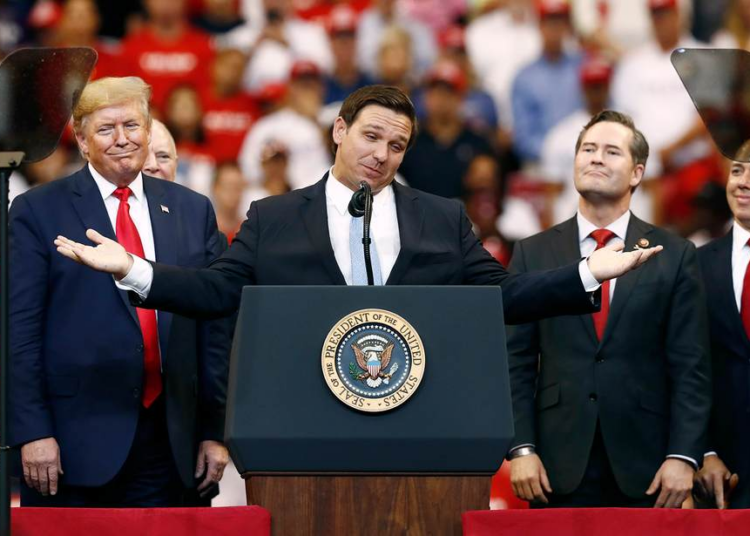A few thoughts from the shock …
Ron DeSantis’ exit from the 2024 GOP presidential primary contests came as a surprise yesterday … but only in terms of timing. The Republican primary had not really been a question of the direction of the party. Nikki Haley and Chris Christie tried their best to make that argument, to little effect, especially in Iowa. The party wants pugnacious populism, for which DeSantis had clearly established credibility in Florida.
The question of this cycle was whether the party base still wanted Trump to be that leader. The polls consistently showed that more than half of the party wanted Trump, baggage and all. DeSantis bet that he could upend that commitment with ground organization and tireless politicking in Iowa.
DeSantis got his answer, as did we all. As long as Trump wants to lead that pugnacious populism, the populists want him as a leader. In the end, this wasn’t about DeSantis, Haley, or even Joe Biden. The primaries are about pushing back again, much as they were in 2016, only this time Trump is commanding majorities rather than pluralities in practically every state.
There have been a number of post-mortems that second-guess DeSantis’ campaign decisions. If only he hadn’t used Twitter spaces … If only he had drawn more of a policy contrast … if only he had hired better people …. All of those miss the point, just as the televised debates largely did. This was less of a primary and more of a referendum on Donald Trump as the incumbent party leader.
Michael Lind calls it an end to “pseudo-Trumpism,” but there was nothing pseudo about DeSantis’ populism. DeSantis was sincere in his approach, although perhaps more open to incorporating movement conservatism than Trump. He has spent five-plus years governing Florida in a populo-conservative (or conservo-popular) mode.
Republicans just didn’t care. The vote in Iowa made four things crystal clear:
- Populist voters (MAGA, if you will) prefer the original Trump to a successor, no matter how solid a record the latter has, as long as Trump’s available.
- Organization and hustle only gets you so far when your party’s incumbent — or quasi-incumbent, in this case — decides to run.
- The polling turned out to be pretty accurate in Iowa.
- Related to 3, few if any Trump voters wanted to change their support at the critical decision point.
Those who criticize DeSantis for pulling out now and endorsing Trump miss those two critical issues. Haley will run the string out in New Hampshire and South Carolina, at least, but the polling shows the same thing in both states (although somewhat more ambiguously in tomorrow’s contest). Trump will likely run the table regardless, and the will of the party has been made clear.
You don’t have to agree with the base on that decision. You don’t have to like it, either. But it’s impossible now to deny it.
I find it disappointing that DeSantis didn’t stick it out until Super Tuesday, and secondly that he immediately endorsed Trump rather than waiting to the end. But DeSantis wants to run again in 2028, and will be an attractive option for the GOP. He doesn’t want to alienate the conservo-populist base of the Republican Party by engaging in a pointless extension of a quixotic battle against a coronation. That makes sense for DeSantis, who does have a job to which he can return, even if others wanted him to take a stand on principle.
What about Haley? If nothing else, she provides a test for another assumption from the start of this process — that Republicans wanted a change of direction as well as a change of leadership. It’s a two-person contest now on that very question, but thus far the polls are providing an answer to that as well. If they wanted a change of direction, the primary offered several options in that direction, from the A-list (Haley, Mike Pence) to the exile (Christie) to the obscure (Doug Burgum, Asa Hutchinson). Only the money seems interested in Haley, and only for now.
Again, you don’t have to agree or like these results, but you can’t deny them, either.
So what’s next? Clearly, Republicans want a rematch of 2020 and will likely get it. Democrats may be less enthusiastic about Biden, but they’re stuck with him — and see Trump as the most beatable candidate in the general election. They may well be correct about that, but they may be miscalculating Biden’s ability to beat anyone in this cycle. If we have learned that GOP primary polling appears to be broadly accurate, then we can surmise that general-election polling is accurate enough to give us reliable data on trends. And while most of Biden’s approval-number problems these days can be attributable to unhappy Democrats and Dem-leaning unaffiliateds, the gen-elex polling doesn’t show them thundering back to Biden.
It’s a long way until November, of course. Both parties will likely unify behind their incumbents when the time comes, but we should see that trend in polling over the spring and summer. If there’s a concerted rebound for Biden, it should become apparent even earlier now that Trump has essentially wrapped up the nomination, barring a huge black-swan event. If those gen-elex number don’t shift soon for Biden, especially in the swing states, they may have reason to dread this rematch.

